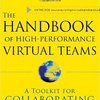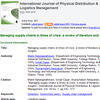 This is another post resulting from my literature review when researching background material for my book chapter on managing risks in Virtual Enterprise Networks, something that seems to have caused a barrage of seemingly never-ending book reviews on this blog. In The Handbook of High Performance Virtual Teams: A Toolkit for Collaborating Across Boundaries
This is another post resulting from my literature review when researching background material for my book chapter on managing risks in Virtual Enterprise Networks, something that seems to have caused a barrage of seemingly never-ending book reviews on this blog. In The Handbook of High Performance Virtual Teams: A Toolkit for Collaborating Across Boundaries, Jill Nemiro and her co-editors have put together a 764-page monster of a book. It’s not a handbook, it’s a handbrick.
Knowledge-laden and heavy
It is a true monster of a book and I mean that in a positive way. I cannot imagine anything that is left uncovered on the topic of virtual teams. Which perhaps makes it rather difficult to keep the necessary distance and oversight, the index alone is some 47 pages long.
The esssence
What is comes down to is that virtual teams have six challenges: Distance, Time, Technology, Culture, Trust and Leadership. These six challenges are presented in 28 contributions from different authors, where each contribution takes on one or more of these challenges. Luckily the book comes with a matrix, so if you want to read about Time, you can read contribution 1, 14, 19, 25 and 28. And so on for the other challenges. That is very helpful.
So what is it about?
Distance means working without face-to-face contact, resulting in lack of personal bonding. Time means the challenges from working in different time zones, often globally, and the advantages of 24/7 production versus the disadvantage of no real-time collaboration. Technology deals with the challenges of compatible and incompatible ICT and how to make the team members make the best out of their tools. Culture has to do with the challenges arising from teaming different cultures, especially if your team is global. Trust is usually slow to develop without personal contact, another challenge when you only meet in virtuality. Leadership tells how virtual team leaders must fill many roles and develop different skills than traditional team leaders.
Could it not be shorter?
Is it a bit overdone? Why not simply six chapters for the six challenges? Well, the individual contributions are valuable, and I can tell that, having read some of them. The authors all bring their personal insights into their subjects, and I guess, if you want to focus on the challenges of technology in your virtual team, it is helpful to have a couple of opinions, not just one.
The verdict
Still, reading this book from cover to cover is a daunting task, and not something I am likely to undertake. Nonetheless, I think it is one of the best books on virtual teams currently on the market.
Reference
Nemiro, J., Beyerlein, M., Bradley, L., & Beyerlein, S. (2008). The Handbook of High-Performance Virtual Teams. San Francisco, CA: John Wiley & Sons.
Publisher link
Visit our partner Wiley.com to save 15% on your entire online order. To save, enter discount code AFF15 in the Promotion Code field as you’re checking out. Click the Apply Discount button so your savings are calculated.
- wiley.com: Virtual Teams
amazon.com
Related
- husdal.com: Book Review: Cooperative Strategy












